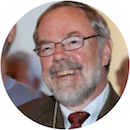The leadership guru Max DePree once wrote that “The first responsibility of a leader is to define reality.” He captures nicely the notion of the poet Wallace Stevens that we live in our descriptions of a place and not in the place itself.
Sometime I feel we are living in a world of badly-defined reality!
In my prior life as a seminary administrator I once had a colleague who had come from Britain to take a position on our faculty. Before studying theology, he had worked as a television reporter in the Middle East which gave him a range of experiences that helped him adapt very well to most aspects of life in the United States.
One aspect of American life that baffled my colleague was the fluidity of religious affiliation. Nothing in his British or Middle Eastern experiences prepared him for the relative ease with which Americans move from one faith community to another. In our 1987 book, American Mainline Religion, Wade Clark Roof and I called this a “new voluntarism” in which choice replaces inheritance as the basis of religious belonging and individuals pick and choose from a cafeteria of religious options.
In my work consulting with local churches on behalf of the Center for Progressive Renewal, the fact that faith communities often don’t recognize they are in an increasingly competitive religious marketplace strikes me. Like my British friend, they think of religious affiliation as something inherited from previous generations. For congregations worried about maintaining their membership base, the implicit goal becomes holding on to their own young people as they mature. It’s not working as it once did as young people exercise their freedom to choose or, increasingly, to opt out of religious participation altogether.
Part of our job as religious leaders is to help our communities redefine the reality in which we find ourselves. One aspect of that new reality is an open religious marketplace in which no religious tradition any longer occupies a privileged position.
This may seem obvious, but most faith communities seem stuck with old and faulty definitions of reality. We assume that religious boundaries remain fixed when in fact they are increasingly fluid. The Pew Religious Landscape survey reports that 42 percent of Americans currently identify with a different religious denomination than they did as a child. In the same study, 23 percent of those polled were religiously unaffiliated, a figure that rises to 36 percent of persons 18-29.
The new religious marketplace presents both opportunities and challenges for congregations.
The opportunity lies in a new openness to religious and spiritual messages from a wider range of groups. The days are over when persons of Northern European ancestry heard only from Lutherans, when Poles, South Americans and Italians listened only to Catholic voices, when Southerners’ choices were Baptist or Methodist. In the new reality, religious loyalty is no longer assumed by birth. It is earned!
The challenge lies in the fact that some religious traditions have had little experience speaking with persons and groups who don’t share their social and religious backgrounds. Here the old-line churches are at a competitive disadvantage. These churches once occupied a privileged position in their communities and could assume their neighbors knew what they stood for. These churches could simply wait for people to find them.
Those days are over. It is time for religious groups to recognize the need to go public with their religious and theological convictions.
I recently worked with a congregation whose building is located on a prominent thoroughfare in its suburban community. The church is pretty cautious when it comes to sharing its faith. As one member told me, “No-one would ever confuse us for Baptists and that’s just fine with me.” But the church has become a bit more bold and adventurous in recent years. Attached to its sign is a small rainbow flag and on its lawn is a “Black Lives Matter” sign. In my interview with members I asked people what originally attracted them to this church. Virtually all of the newer members I interviewed mentioned the flag and the sign. “I had driven by the church for years,” said one member. “One day the flag appeared and it told me I was welcome.”
It is time to define our new reality and to go public on matters of the spirit!

Bill McKinney is a sociologist of American religion and Senior Consultant with the Center for Progressive Renewal. Previously he served for 14 years as president of Pacific School of Religion in Berkeley.
